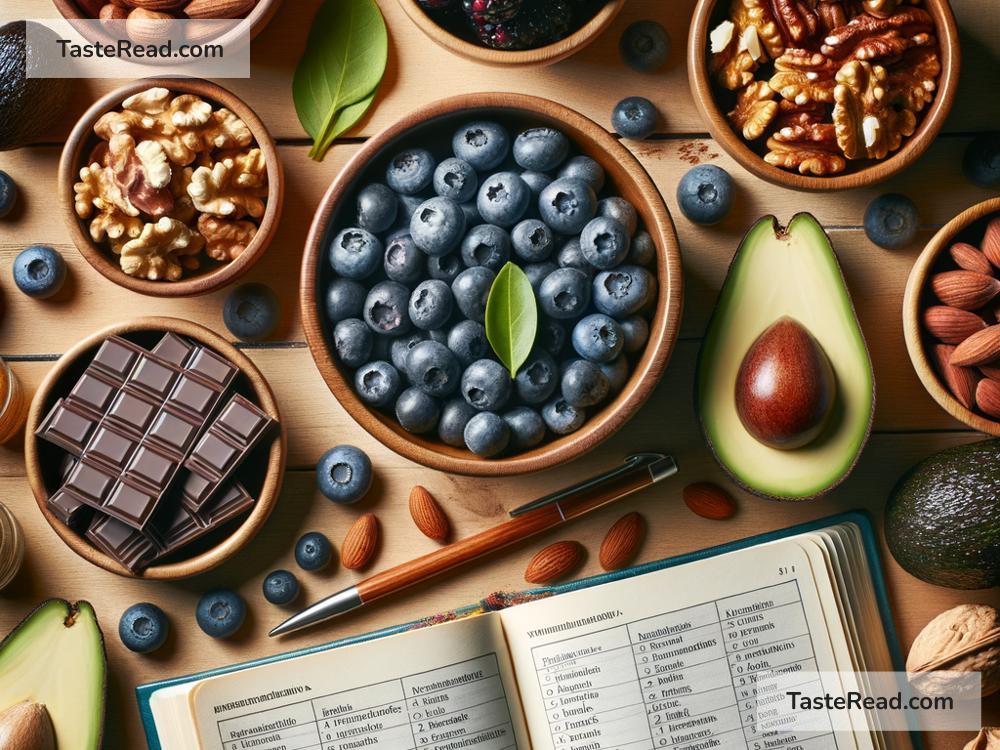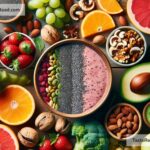Foods for Enhancing Vocabulary: Brain-Boosting Snacks and Tips
Do you ever struggle to find the right words during a conversation or feel like your vocabulary could use a little extra power? Expanding your vocabulary is not only about learning new words—it’s also about giving your brain the fuel it needs to process, remember, and use those words effectively. Believe it or not, your diet can play a big role in how well your brain functions. By eating the right foods, you can unlock more mental clarity, focus, and memory, which all help when you’re trying to learn and retain words. Here are some delicious foods that can help boost your brain and sharpen your vocabulary skills.
1. Blueberries: Nature’s Brain Booster
Blueberries are often called “superfoods” for the brain. These tiny berries are packed with antioxidants that protect brain cells from damage and improve communication between neurons. Studies show that blueberries can enhance memory and cognitive function, making them a great snack for learning new words.
How to eat them: Add blueberries to oatmeal, blend them into a smoothie, or munch on them fresh as a midday snack.
2. Salmon: A Source of Omega-3 Fatty Acids
Salmon is rich in omega-3 fatty acids, which are essential for brain health. Omega-3s improve focus, boost mood, and help your brain process information faster. These nutrients also strengthen memory, which is crucial for remembering new vocabulary words.
How to eat it: Grill salmon for dinner, enjoy a salmon sandwich, or toss salmon chunks into a salad. If you’re not into fish, try other sources of omega-3s like walnuts, flaxseeds, or chia seeds.
3. Leafy Greens: Spinach and Kale Power
Spinach, kale, and other leafy greens are full of vitamins like folate and vitamin E, which reduce inflammation and improve brain function. They support memory and focus, helping you retain new information and words.
How to eat them: Add spinach to soups, use kale in a salad, or blend leafy greens into a green smoothie. Spinach omelets or kale chips are also great options.
4. Eggs: The Choline Connection
Eggs are a fantastic source of choline, which is a nutrient that helps the brain produce acetylcholine—a neurotransmitter important for memory and learning. A healthy dose of eggs in your diet can boost your ability to absorb and recall new vocabulary.
How to eat them: Scramble eggs for breakfast, make a veggie-packed omelet, or snack on hard-boiled eggs throughout the day.
5. Nuts and Seeds: The Perfect Brain Snack
Nuts like almonds and walnuts, along with seeds like sunflower seeds and pumpkin seeds, are packed with healthy fats, antioxidants, and protein. These nutrients provide energy to your brain and improve cognitive functions like memory and focus. Walnuts, in particular, contain omega-3s, while sunflower seeds are loaded with vitamin E.
How to eat them: Grab a handful of nuts and seeds as a snack, sprinkle them onto yogurt or oatmeal, or toss them into salads for a crunchy twist.
6. Avocados: Creamy and Brain-Friendly
Avocados are rich in healthy fats that improve blood flow to the brain. Better blood flow means your brain gets more oxygen and nutrients, which helps it stay sharp and focused. Avocados also contain vitamin E, which protects your brain from aging and enhances memory.
How to eat them: Mash avocados into guacamole, spread avocado on toast, or slice them into salads. You can even blend them into smoothies for a creamy texture!
7. Dark Chocolate: Treat Your Brain
Good news for chocolate lovers! Dark chocolate is rich in flavonoids, which improve blood flow to the brain and boost attention, memory, and mood. This makes learning new words feel more enjoyable and less stressful.
How to eat it: Go for a small piece of dark chocolate as a dessert or pair it with nuts for a nutrient-packed snack.
8. Green Tea: Refresh and Revive
Green tea contains caffeine and an amino acid called L-theanine, which together improve focus and mental alertness. It’s a great beverage to sip while you’re studying new vocabulary words or reading books to boost your language skills.
How to drink it: Brew a cup of green tea in the morning or replace your afternoon coffee with green tea for a brain-friendly alternative.
9. Whole Grains: Boost Your Energy
Whole grains like oatmeal, brown rice, and quinoa provide your body with a steady supply of energy throughout the day. A well-fueled brain processes information faster, making it easier to grasp new words and use them properly.
How to eat them: Start your day with a bowl of oatmeal, swap white rice for brown rice at lunch, or use quinoa as a base for salads.
Bonus Tip: Stay Hydrated!
While food is important, don’t forget to drink enough water! Dehydration can slow down your brain and make it harder to concentrate. Keep a water bottle handy when studying new vocabulary.
Final Thoughts
Your brain is like a muscle—it needs the right nutrients to stay strong and perform its best. By including brain-friendly foods like blueberries, salmon, nuts, and dark chocolate in your diet, you’re giving your brain the power it needs to learn, remember, and use new words more effectively. Combine a healthy diet with regular reading, writing, and language practice to expand your vocabulary and sharpen your communication skills.
Remember, eating healthily isn’t just for your body’s benefit; it’s also a smart way to feed your mind. So, grab a handful of walnuts, brew a cup of green tea, and start working toward a bigger, better vocabulary—one brain-boosting bite at a time!


